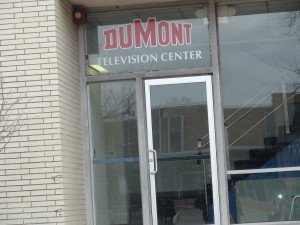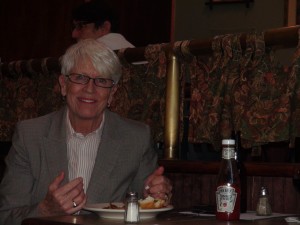NJTV rises from NJN ashes; still seeks funds
MONTCLAIR, N.J. — Like several U.S. public television stations, New Jersey Network, (NJN), struggled for funding, but lost in 2011 and is now New Jersey public Television, (NJTV), operating from college campuses.
Gov. Chris Christie of New Jersey decided he no longer wanted to be in the television business. Therefore, in June 2011, he stopped state funds to the 43-year-old NJN and closed the State-owned building in Trenton. This forced several employees out of work and left NJN to find a new business location, a different schedule, a smaller workforce, and a new name.

John Servidio, general manager of NJTV, sits in a conference room at Montclair State University in March, where he discusses the operations of the new television station. He said that NJTV is doing well, but it needs money to continue to operate as an improved public television station in New Jersey.
John Servidio, general manager of NJTV and a Montclair resident, said that, “NJN was financed primarily by the State of New Jersey when it was in operation. Gov. Christie’s administration decided that it wasn’t wise for the State to be financing a station with a new show on it that was covering Gov. Christie and the administration so they stopped funding for that reason and to save some money.”
NJN had a staff of about 130 employees and operated on a yearly budget of approximately $33 million. When Gov. Christie cut funds to NJN, nearly all these employees were laid off. The governor hoped to save the state about $11 million, reports Peggy McGlone of The Star Ledger.
New Jersey’s new public television station now broadcasts mainly from Montclair State University, (MSU). Effective July 1, 2011, NJTV came on the air as an independent public television station that has a five-year contract with New York’s WNET Channel 13. WNET oversees NJTV’s programming, making it New Jersey centric, and also cost saving to New Jersey’s taxpayers, McGlone writes.
However, when NJTV first debuted, the ratings were lower because there were some New Jersey residents who believed it was now a New York property. NJTV has worked diligently to dispel that myth, said Servidio. The new network also suffered a bit at first because it had fewer staff members and a smaller budget. They have been operating with only 26 full-time journalists and on a budget of only about $9 million for fiscal year 2013.
Servidio said when New Jersey’s governor closed NJN, several companies put bids out to help develop a new network and WNET’s bid won. He said, “We had about a week, week and a half to put the station together.” However, they managed to set up the station by July 1, but it was not as professional as they would like it to be. With much fewer staff and great improvisation, he said that over 20 months, the station has improved and continues to get better.

The DuMont Television Center at Montclair State University houses the NJTV studios since July 1, 2011, when NJN lost state funding and its state-owned building.
Corporation for Public Broadcasting, (CPB), and Public Broadcasting Services, (PBS), currently are the primary financial supporters of NJTV, Servidio said. NJTV is among several U.S. public television stations that are under-funded by their states even though their main purpose is to gather content to serve their local communities.
The Jan. 29, 2007, U.S. Accountability Office Report shows that there are about more than 300 public television stations in the United States that evolved from a handful in the 1950s, and in 1952 the Federal Communication Commission, (FCC), decided that they should serve their communities locally.
The U.S. Accountability Office Report states that, “CPB’s primary responsibility is distributing federally appropriated funds to benefit public television and radio.” On the other hand, PBS is a nonprofit membership organization made up of licenses of public television stations. Fees paid by its member licensees, underwriting, and grants from CPB and other federal sources, fund PBS, the report states.
Larger public television stations, such as WNET of New York and WGBH of Boston, supply smaller public television stations with their programming. CPB and PBS do not necessarily produce programming. However, according to the report, “PBS acquires children’s and prime-time programming and operates a satellite-based interconnection system to distribute this programming to member licensees.”

Debra Falk is the director of communications at NJTV at Montclair State University in Montclair, N.J. She talks about the status of the new public television station, mentioning that it offers a variety of programming and has a great online presence.
Therefore, many public television stations broadcast some PBS prime-time and children’s programming, but some like NJTV, also improvise with content bureaus on various New Jersey state college campuses to find other content such as local programs that include community events and history, arts and culture, public affairs and also non-broadcast services that help teachers, said Debra Falk, NJTV director of communications.
Even though NJTV gets grants from CPB and PBS, it also improvises for additional funds. NJTV rents its satellite tower at the MSU campus to other channels such as the Food Network to bring in needed funds. It also gets money from corporations, foundations, and from individual memberships, pledge programs and others, Servidio said.
It is very important that public television remains local serving its immediate constituencies, report authors, Amber M. K. Smallwood and Soo Jung Moon, who write an article titled, “Predictors of Localism in Public Television in the United States,” that appears in the 2011 Journal of Broadcasting & Electronic Media.
Smallwood and Moon’s article discusses “the goals and direction of broadcasters across the United States, especially public television stations.” They also note that, “in media regulation, localism was intended to distribute power among local communities to promote a healthy democracy.”
When the governor of New Jersey closed NJN, there were some locals who questioned the call and said they found it to be highly political and not democratic enough. Greg Tift, a local resident and State of New Jersey employee said, “It all depends on conservatism and liberalism.”
[soundcloud url=”http://api.soundcloud.com/tracks/91916960″ params=”” width=” 100%” height=”166″ iframe=”true” /]
He claims the current governor is republican, who is considered conservative, and so he wants to control the messages that go out over the airwaves while he is in office and that is why he closed NJN, which was considered a liberal news outlet.

Jim Hooker stands in front of New Jersey statehouse recently as a former news anchorman of NJN, the previous public television station in New Jersey. He speaks about how he handled the demise of the former station and what he is doing for employment now.
Former NJN Anchorman, Jim Hooker, also said there was a school of thought that NJN was closed to appease a wealthy political family in the north. However, Hooker also said the family denied the rumor.
Like many of his colleagues, Hooker did not immediately find new employment. He said he worked for a local political website, and then briefly as a writer for CBS in New York, before coming back to New Jersey where he found a more stable position as a chief of staff employee for a senator.
The City of Trenton North Ward Councilwoman, Marge Caldwell-Wilson, expressed dismay that the governor put so many well-known people who had became an institution in the community, out of work and left a vacant building in her ward in the city.

Marge Caldwell-Wilson is a City of Trenton courncilwoman for the North Ward. She is active in the community; seen here on a recent Wednesday evening at a Mill Hill District community meeting. Caldwell-Wilson also had opinions about the closing of NJN.
“It was very upsetting to find that the governor was not going to fund public television anymore. Apart from the fact that I miss the regular scheduled programs that were on NJN; I think they did an amazing job, but I am concerned about that empty building that’s just sitting there,” Caldwell-Wilson said.
Public television is among other media forms like newspapers and magazines that have financial challenges. Three authors, David D. Kurpius, Emily T. Metzgar, and Karen M. Rowley, try to analyze this crisis in their article, “Sustaining Hyperlocal Media: In search of funding models,” that appears in the journal of Journalism Studies.
These authors believe traditional media are shrinking because it is typical of a mature industry. They argue it is a gradual decline and that we must meet the challenge by trying to find alternative ways to fund new media.
They also note that it is good news for public television because they can fill the niche of providing the local news that traditional media no longer seem to be reporting in detail. Recently, more people are going online and traditional media are losing advertising revenues.
They also state the newspaper advertising revenues dropped an estimated 23 percent over the past two years since 2010, but newspapers are trying to embrace their online communities.
Kurpius, Metzgar, and Rowley contend that public television has the advantage to remain hyperlocal and fill the news gap with local content and they too can have an online presence.
The U.S. Accountability Office Report states that, “today there are 349 public television stations, owned and operated by 173 licensees, which reach 98 percent of the households that have televisions.”
With hopes that NJTV will gain wider viewership, Falk of NJTV said that they have tried to improve the new public television network by broadcasting in high definition (HD) and also by creating a much better and more robust online presence.
Servidio said he hopes the station will get much better as the economy and viewership improve. Hooker, NJN former anchorman, said he believes NJTV will pass “something of a taste test” and will survive beyond five years.